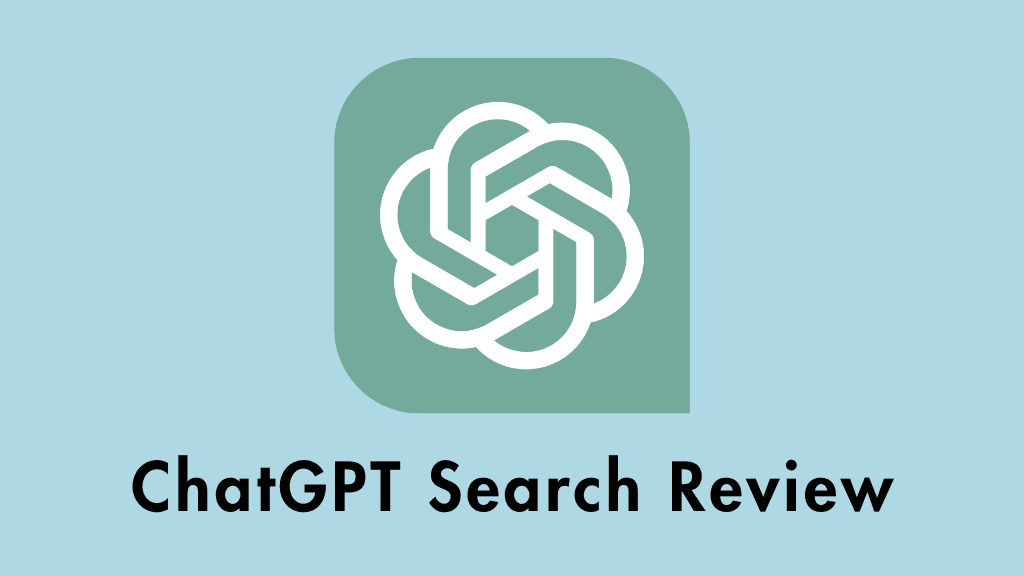
There’s a lot of talk right now about Google being ‘broken.’
And it’s easy to see why: a sea of sponsored links pushing proper web results way below the fold. AI Overviews that tell people to put glue on their pizza. And ‘helpful content updates’ that kill expert websites by excluding them from search results, replacing them with out-of-date Forbes reviews and spammy Reddit discussions.
Perhaps then it’s the perfect time for a platform that’s already been shaking up the whole search industry, Open AI’s ChatGPT, to debut its own search engine.
I’ve tried it out and in what follows, I’m going to give you my take on how good it is. I’ll start with a bit of background on how to access it, and then discuss its pros and cons (and whether it represents the future of search in general).
Before I dive in though, I just want to highlight that OpenAI’s new search engine is eventually going to come in two different flavors: ‘ChatGPT Search’ and ‘SearchGPT.’
‘ChatGPT Search’ is a version that is fully incorporated into ChatGPT itself, and easily accessible from within the interface.
‘SearchGPT’ is a ‘standalone prototype’ version that will be accessible in a similar way to Google — i.e., via a dedicated web page that lets you enter search queries and view results for them.
The version that’s now live, and the one I’m discussing here, is ChatGPT Search.
How to access ChatGPT Search
ChatGPT Search is accessible via the main ChatGPT interface — but note that it’s only available to those on a paid plan or the SearchGPT waitlist. To use it, you’ll need to log into your account and then click the new globe icon in the ‘Message ChatGPT’ box.
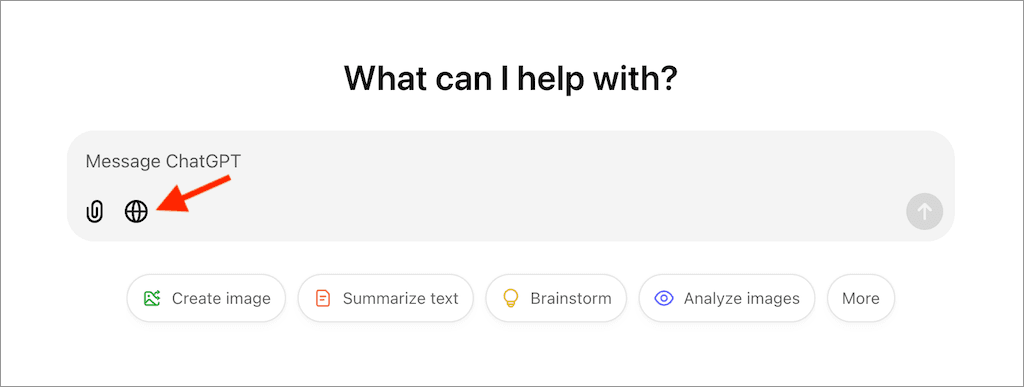
Doing so displays a little ‘Search’ label that indicates that you’re now searching with ChatGPT, rather than simply conversing with it (although in truth you’re actually able to do both with search enabled — more on which later).

Testing ChatGPT Search
I started my ChatGPT search test by entering my band’s name, ‘Five Grand Stereo,’ into the input box. This is what’s known in SEO circles as a ‘head keyword‘ — a phrase that doesn’t really provide a search engine with much context about the search. (Did I want to visit the band’s website? Go to a gig? Buy a CD?)
I was pretty pleased with the results — ChatGPT surfaced a link to the band website, some images associated with it, some biographical details and a YouTube video for one of our songs.
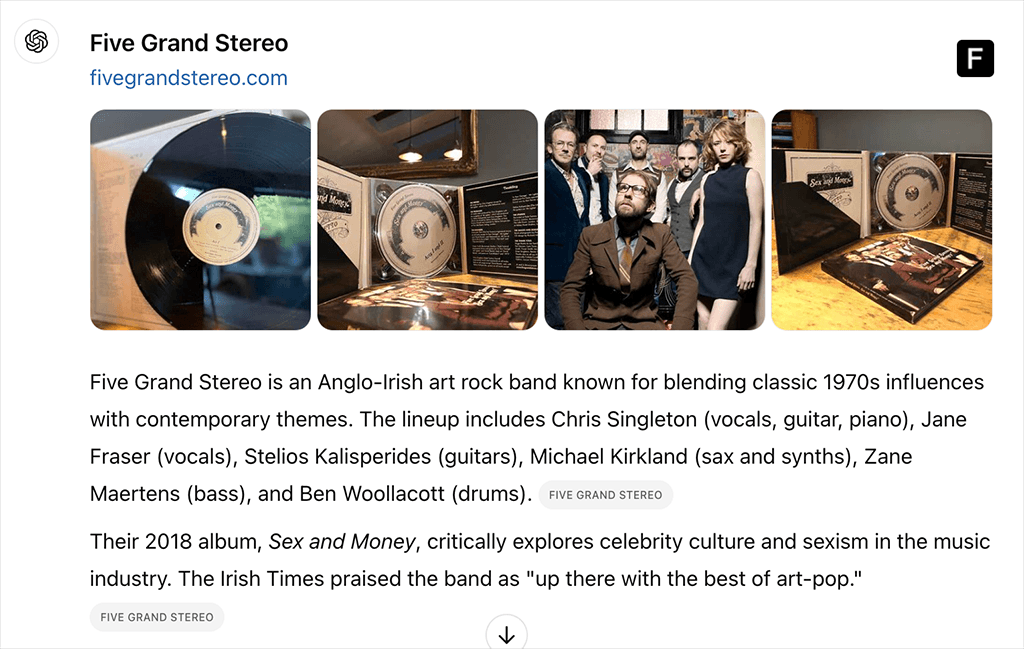
The main thing I liked about the presentation was the ‘clutter-free’ approach. It was reminiscent in many ways of the early days of Google — an era where the aggressive placement of sponsored ads didn’t take priority over the provision of requested information.
(There were no sponsored ads at all to be seen in the search results provided by ChatGPT Search — but I suspect that this won’t remain the case indefinitely!).
The content creator in me was also pleased to see lots of opportunities for the user to click through to information about the band — there were plenty of links to the official band website, and external sites too.
These came in the form of a prominent link to the official band site at the top of the summary, clickable ‘tabs’ underneath the paragraphs it contained and ‘citation links’ on the right hand side of the screen.
(I’ve highlighted a few of these in the screenshot below).
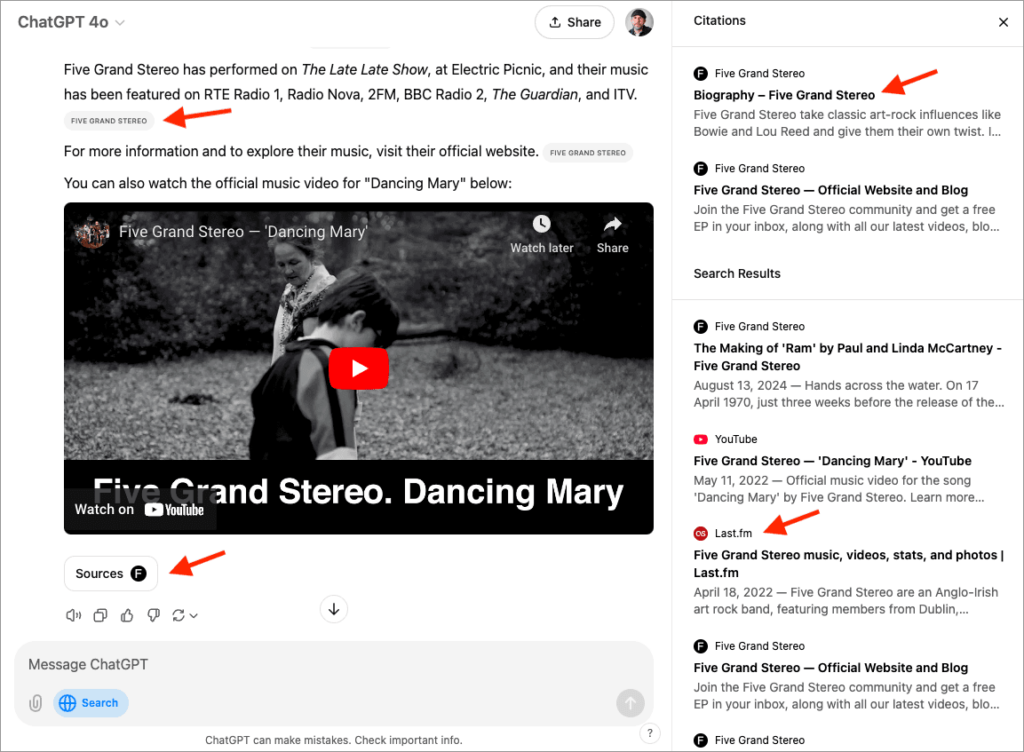
However, there were a couple of things that bugged me about the results presented.
First, clicking on any of the links provided opened the relevant website in a new tab. This leads to a poor user experience in my view, because it makes it harder to get back to ChatGPT Search and refine or continue a search journey — i.e., you can’t just click the back button to return to the search box (as you can in Google).
This isn’t the end of the world for desktop users, because it’s easy enough to switch tabs on a desktop web browser — but it’s usually a lot more fiddly to do this on a mobile device.
And second, despite there being quite a few images of Five Grand Stereo merchandise displayed, clicking on them didn’t take me through to product pages. So if I had been a user that had wanted to enter the band’s name with a view to buying one of its LPs, I would have been disappointed or confused by what was presented.
After checking out my band on ChatGPT Search, I moved onto a search that involved a ‘long tail’ keyword — a phrase containing more words, and one that gives a search engine more clues about what a user is searching for. The phrase I used here was ‘best strings for nylon guitar.’
I was much less impressed with the results offered here: ChatGPT began by giving me a very vague (and very ChatGPT-esque) statement that didn’t really tell me anything:
“Selecting the optimal strings for your nylon-string guitar depends on your playing style, desired tone, and instrument characteristics.”
It then followed this up with a list of suggested nylon string products. At first this struck me as useful enough — until I noticed that all the suggestions provided came from one website (American Songwriter).
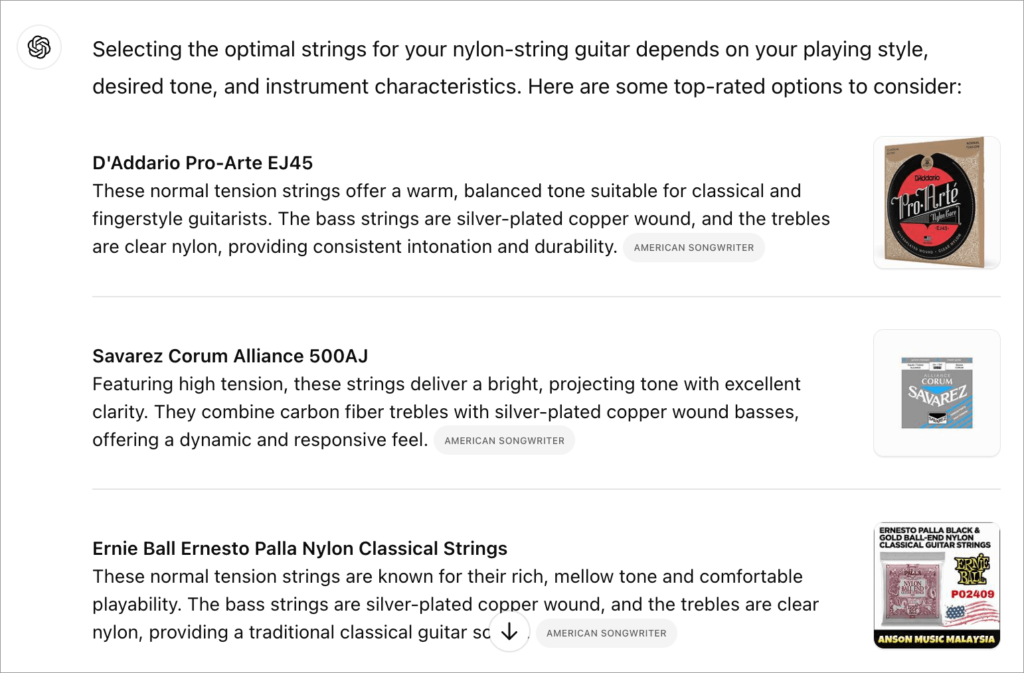
Not only did these suggestions come from the same website, but they were all from the same article. Again, there were no product links, so if my intent was to buy something — and a phrase like ‘best strings for nylon guitar’ suggests as much — I would have been disappointed.
Thankfully, there were more diverse results to be found on the right hand side of the screen in ChatGPT Search’s ‘citations’ and ‘search results’ sections. So it wasn’t all bad.
Next, I tried out a location-based search, using the well-worn ‘coffee near me’ phrase.
And ChatGPT did indeed give me some results that reflected my location. However, they were very ‘generic’ in nature — the coffee shops suggested were ‘notable’ outlets for the city I happened to be conducting my search in, and not particularly near me.
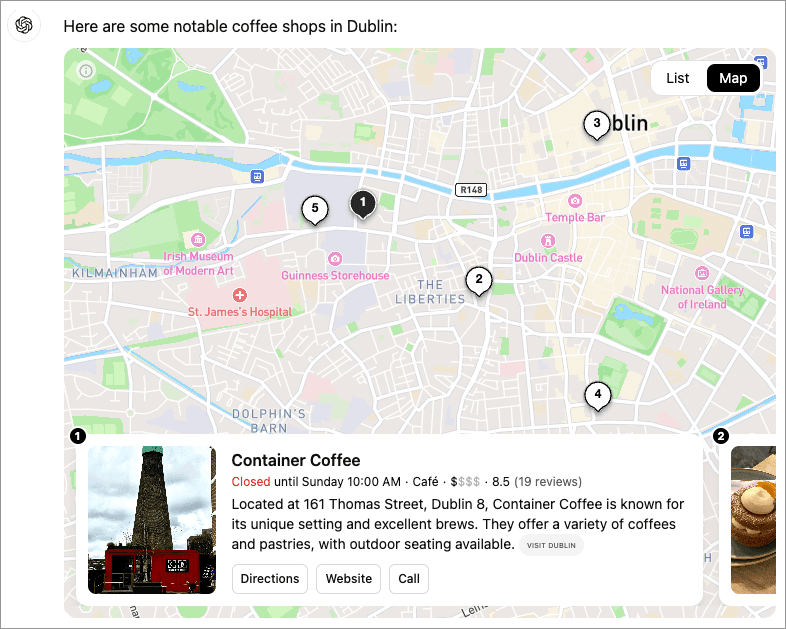
Location-based searches on other platforms like Apple Maps and Google Maps gave me much more relevant results for the same queries (and crucially, the coffee shops recommended by them were actually within walking distance!).
Finally, I asked ChatGPT Search for directions from point A to point B, using the search query “Directions from Dublin Airport to Heuston Station.” This gave me a list of transit options sourced from third-party websites (mainly Rome2Rio), accompanied by links to them.
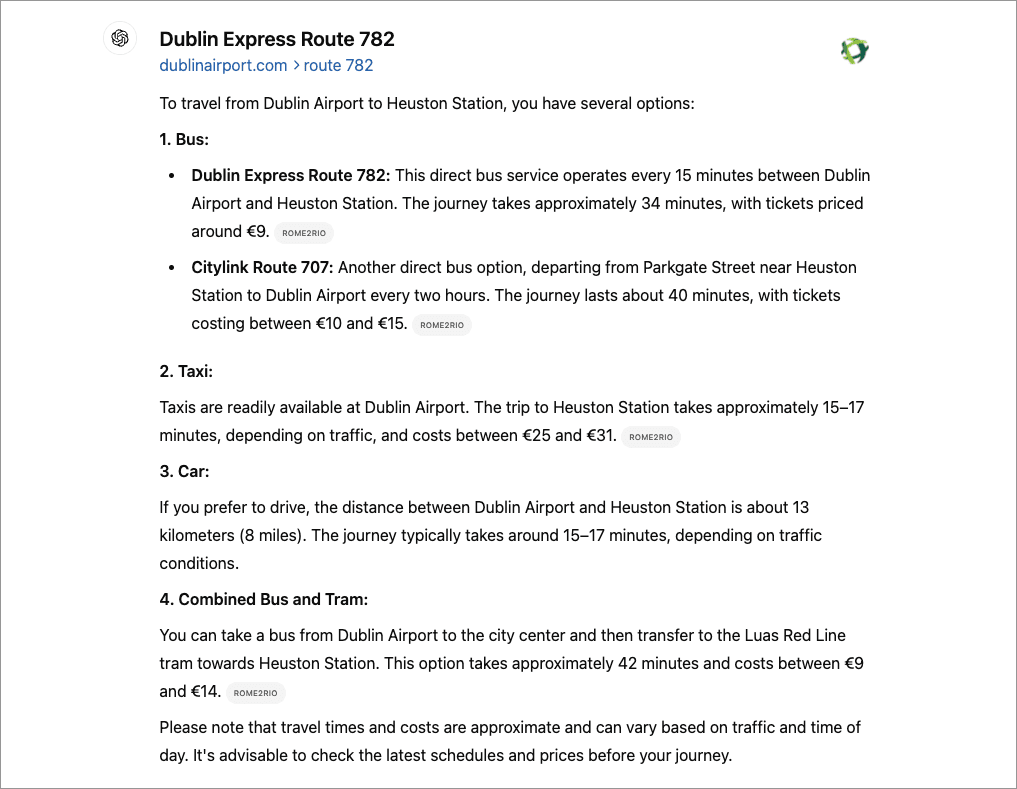
For some reason however, there was no link to click on for further details about the ‘travelling by car’ option. So I refined my query to include the phrase ‘by car.’ And interestingly, as you can see from the screenshot below, the search result I got here was a Google one — I was encouraged to click on a Google Maps link to find out how to get to my destination.

So what to make of all this? Well, the results provided by ChatGPT Search for my various query types felt like a bit of a mixed bag. On the plus side, they were clutter and ad-free, and much of information provided enabled me to complete my search journeys in a time-efficient, ‘zero-click’ manner — i.e., many of the responses provided gave me enough to go on, without a need to click out of ChatGPT for additional answers.
On the flip side, there wasn’t much diversity of results, and the location and direction based search results left quite a bit to be desired. I certainly wasn’t so impressed that I felt that I’d never perform a Google search again.
But ChatGPT Search has an important trick up its sleeve that does give it an edge over Google and other search engines.
Let’s take a look at that now.
ChatGPT’s USP: a conversational interface
So far in this review I’ve explained how during my tests, I used ChatGPT Search in a way that you might use a traditional search engine like Google. But ultimately, doing that isn’t entirely fair.
There are a couple of reasons for this.
First, unlike a regular search engine, ChatGPT Search offers an interface that delivers direct answers to user queries rather than a bunch of links. Yes, you get links too, but if you don’t want to sift through them, you don’t have to — as I outlined above, in a lot of cases, the answers provided by ChatGPT Search remove the need to click on anything.
And significantly, ChatGPT Search remembers details from your previous interactions and searches, enabling more contextually relevant responses to follow-up ones.
Here’s an example of this in action. Earlier I shared an example of ChatGPT Search giving me some fairly comprehensive information about my band, Five Grand Stereo. But as you can see from the screenshot below, with ChatGPT Search, I didn’t have to leave things there — I could ask a follow up question. Not only did ChatGPT know what I’m talking about (without me mentioning the band name again), the answer it gave me was detailed, source-rich and entirely accurate.
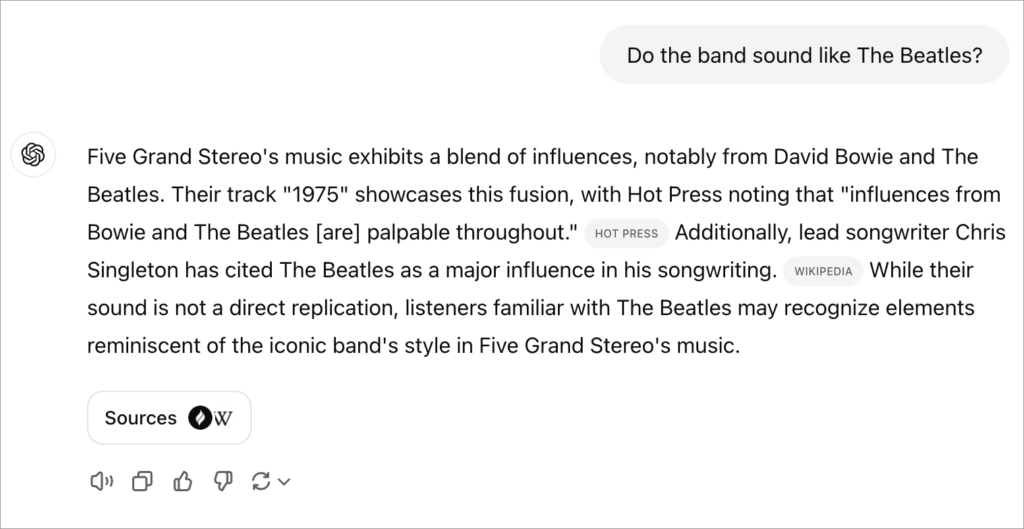
And it’s this interactive, highly-conversational approach (the ‘chat’ in ChatGPT search) that represents the key advantage of using ChatGPT Search over its rivals.
The future of search?
So is ChatGPT Search the future of search? Well, while there’s scope for improvement in the information it surfaces, its ‘zero click’ responses and conversational interface certainly have the potential to shake things up enormously.
It’s hard to say whether Open AI’s search engine will in time become the default one, but as things stand, I’d be surprised if its launch wasn’t already compelling Google to issue more of those ‘code reds’ that greeted ChatGPT’s initial arrival.
At the very least, it’s easy to imagine Google and other competing search engines ultimately going down a similar route, and the future of search in general involving a more conversational approach like ChatGPT Search’s.
Sadly for publishers, this will mean less clickthroughs to their publications. For users though, there may be much to like.
📚 Related resource: ChatGPT statistics
Don’t miss out on our free SEO toolkit
For a limited time only we’re offering our readers some excellent free SEO tools and resources. Sign up now to immediately receive:
- our downloadable cheatsheet containing the 20 key steps to ranking highly in search results
- extended free trials and discounts for leading SEO tools
- our downloadable cheatsheet on how to grow organic traffic to a blog
- 2 in-depth guides to SEO
- ongoing free tips and advice on SEO and growing your business
No comments